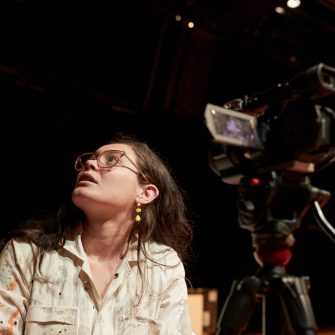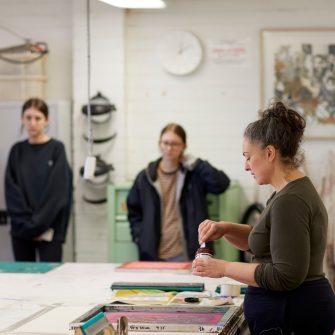Master of Teaching (Primary)
- Commencing Terms
- Term 1
- Duration
- FT 1.3 / PT 2.3 Year(s)
- Delivery Mode
- Face-to-face (includes blended), Online
- Campus
-
Kensington
- Codes
- UAC code 910205
- Program code 8925
- CRICOS code 099104G
-
Commonwealth Supported Places are available for this program2026 Indicative CSP first year fee
- $4,500*
-
2026 Indicative CSP fee to complete degree
- $9,500*
-
2026 Indicative first year full fee
- $47,000*
-
2026 Indicative full fee to complete degree
- $98,500*

Application closures for 2026
International applications for all undergraduate programs, as well as postgraduate programs offered by the faculties of Arts, Design & Architecture, Engineering (excluding Master of Information Technology and associated programs) and Science are now closed to New Overseas Student Commencement (NOSC) for 2026 intakes.
Postgraduate programs offered by the Business School and the faculties of Law & Justice and Medicine & Health remain open. Master of Information Technology (and associated programs) also remain open.
- Overview
- Entry requirements
- What will I study?
- Future careers
- How to apply
- Fees & Scholarships
- FAQs
Master of Teaching (Primary) overview
This master's degree is Australia’s only primary teaching degree program of its kind, offering a fast-track to employment as a qualified primary school teacher. You’ll learn from experienced academic lecturers and practising teachers, developing the knowledge and practical skills to meet the Australian Professional Standards for Graduate Teachers. The curriculum and pedagogy studies span the six key learning areas of the primary curriculum:
- English
- Mathematics
- Science and Technology
- History and Geography
- Creative Arts
- Personal Development, Health and Physical Education
Practical experience
The degree is founded on in-school professional experience and learning in-practice with ongoing support from experienced UNSW School of Education Academics. The theoretical concepts you learn in your courses are applied directly to the classroom in this unique site-based degree.
Your professional journey to becoming a graduate teacher is enriched through the dynamic interaction of practice and theory through site-based experiences during your degree program. The journey begins with your In-School Teacher Education Program (INSTEP) that commences in term one. This is your first opportunity to work with students and learn from experienced primary teachers and is continued throughout the program with further site-based experiences as well as supervised professional experience.
Connect with the education sector
UNSW is a valued partner to industry, community, and government organisations, domestically and internationally. We maintain close links with leading public and private schools in Australia, and we’re the only university to have a formal partnership with the NSW Association of Independent Schools. UNSW School of Education is also a preferred provider of professional development and training for the NSW Education Standards Authority (NESA).
Why choose UNSW's Master of Teaching (Primary)?
UNSW's Master of Teaching (Primary) is an accelerated postgraduate program designed to prepare you for a rewarding career as a primary school teacher. Complete the degree in just 1.3 years full-time, gaining hands-on experience through our unique INSTEP program. With accreditation from NSW Education Standards Authority (NESA), and strong partnerships with local schools, you'll be equipped to teach from Kindergarten to Year 6 across Australia and internationally.
Study at a world-leading, globally recognised university
Join a global top 20 university (QS World University Rankings, 2024–2026) and a member of Australia’s prestigious Group of Eight, with a school of education benchmarked with the highest global rating for research (ARC, Excellence in Research for Australia), offering research-informed teaching.
Benefit from strong partnerships and career outcomes
Access extensive school partnerships, mentoring and placements, and join a university ranked for producing Australia’s Most Employable students for six years in a row (Australian Financial Review (AFR) Top100 Future Leaders Awards, 2020–2025).
Gain NSW teaching accreditation
Earn accreditation with the NSW Education Standards Authority (NESA) and graduate ready to teach across primary schools in Australia and internationally.
Access support and opportunities
Access Commonwealth Supported Places (CSPs) for domestic students and thrive in a diverse, collaborative, and inclusive Arts, Design & Architecture community.
Information pack
Want to see more from UNSW Arts, Design & Architecture?
Master of Teaching (Primary) Entry Requirements
To enrol in the Master of Teaching (Primary), you’ll need a recognised three-year bachelor degree with Weighted Average Mark (WAM) of 60+.
You must have completed a recognised undergraduate degree with a major relevant to one or more of the six Key Learning Areas (KLAs) below, consisting of at least eight units (courses) of undergraduate study, with no more than two at first year (level 1) and at least two at third year (level 3).
Key Learning Areas include:
- English
English with a strong core component of study of English literature, communications, creative writing, language studies (English), linguistics, literature studies, media studies (i.e., the theoretical study of media or where the product is a literary text). - Mathematics
Pure or applied mathematics, other studies of mathematics that are relevant to the central concepts, modes of enquiry and structure of the content/discipline(s). - Science and technology
Agriculture, architecture, biology, bio-technology, chemistry, computing studies, design - interior, industrial, graphics, fashion, product, landscape (2 units only), design and technology, engineering, geology, earth and/or environmental science, materials science, medicine, nursing, physics, psychology. - Human society and its environment
Humanities and social sciences, aboriginal studies/languages, anthropology, archaeology, Asia or Pacific studies, economics/business studies, cultural studies/ sociology, geography/environmental studies, government and citizenship, history, legal studies, political science, studies of religion. - Creative arts
Dance including practical experience in choreography and performance in several dance styles and dance history/theory, drama including experiential involvement in making and performing drama, music including performing (singing, playing and moving), listening and organising sound (composing) within a wide range of repertoire, visual arts including art making and art history/theory. - Personal development, health and physical education
Physical education, family studies, sports science, health studies, human movement, nutrition.
Additional requirements:
When submitting your application you will also need to prepare a personal statement outlining why you will be suitable for primary teaching. Your statement should be no more than 150 words and include your reasons for wanting to be a teacher and why you are well suited for that role.
A personal statement is required for all applications, regardless of whether you apply to UNSW directly or via UAC.
Minimum Mathematics Requirement
You must meet the minimum mathematics requirement as follows:
Have completed a two-unit course if HSC* Mathematics (after 2001) and have achieved a minimum Band 4 (70+) in the subject
OR
Have completed 0.125 EFTSL unit of Mathematics in a prior degree and achieved a minimum mark of 65 (credit)
OR
Complete an equivalent two-unit tertiary preparation course via TAFE NSW and achieve a minimum band 4 (70+). This course must be completed prior to commencement of EDST6765 Professional Experience 2 (final 9-week placement)
*If you completed the HSC after 2001, please provide a copy of your results.
If you did not complete the HSC, you may be asked to provide evidence of meeting the minimum mathematics requirement as stated above.
English language requirements
You may be asked to provide evidence of your English proficiency to study at UNSW depending on your educational background and citizenship. English language skills are vitally important for coping with lectures, tutorials, assignments and examinations - this is why UNSW requires a minimum English language competency for enrolment.
If you’re completing an Australian Year 12 qualification (e.g. NSW HSC or equivalent), you do not need to provide anything extra to prove your proficiency. Your qualification will be used as evidence of your English proficiency.
If you do need to provide evidence of your English proficiency, this will be indicated in your application. You can prove this by providing evidence that you meet one or more of the following criteria:
- English language tests and university English courses
- Prior study in the medium of English
- Other qualifications
If you need to improve your English skills before you start your degree, UNSW College’s Academic English Programs are for you. The programs are suitable for various English levels and help you prepare for university studies and life in Australia.
For more details, visit the English Language Requirements page.
To enrol in the Master of Teaching (Primary), you’ll need a recognised three-year bachelor degree with Weighted Average Mark (WAM) of 60+.
You must have completed a recognised undergraduate degree with a major relevant to one or more of the six Key Learning Areas (KLAs) below, consisting of at least eight units (courses) of undergraduate study, with no more than two at first year (level 1) and at least two at third year (level 3).
Key Learning Areas include:
English
English with a strong core component of study of English literature, communications, creative writing, language studies (English), linguistics, literature studies, media studies (i.e., the theoretical study of media or where the product is a literary text).
Mathematics
Pure or applied mathematics, other studies of mathematics that are relevant to the central concepts, modes of enquiry and structure of the content/discipline(s). Science and technology
Agriculture
Architecture, biology, bio-technology, chemistry, computing studies, design - interior, industrial, graphics, fashion, product, landscape (2 units only), design and technology, engineering, geology, earth and/or environmental science, materials science, medicine, nursing, physics, psychology.
Human society and its environment
Humanities and social sciences, aboriginal studies/languages, anthropology, archaeology, Asia or Pacific studies, economics/business studies, cultural studies/ sociology, geography/environmental studies, government and citizenship, history, legal studies, political science, studies of religion.
Creative arts
Dance including practical experience in choreography and performance in several dance styles and dance history/theory, drama including experiential involvement in making and performing drama, music including performing (singing, playing and moving), listening and organising sound (composing) within a wide range of repertoire, visual arts including art making and art history/theory.
Personal development, health and physical education
Physical education, family studies, sports science, health studies, human movement, nutrition.
Minimum Mathematics Requirement
You must meet the minimum mathematics requirement as follows:
Have completed a two-unit course if HSC* Mathematics (after 2001) and have achieved a minimum Band 4 (70+) in the subject
OR
Have completed 0.125 EFTSL unit of Mathematics in a prior degree and achieved a minimum mark of 65 (credit)
OR
Complete an equivalent two-unit tertiary preparation course via TAFE NSW and achieve a minimum band 4 (70+). This course must be completed prior to commencement of EDST6765 Professional Experience 2 (final 9-week placement)
*If you completed the HSC after 2001, please provide a copy of your results.
If you did not complete the HSC, you may be asked to provide evidence of meeting the minimum mathematics requirement as stated above.
English language requirements
You may be asked to provide evidence of your English proficiency to study at UNSW depending on whether you are from an English-speaking background or non-English speaking background. English language skills are vitally important for coping with lectures, tutorials, assignments and examinations - this is why UNSW requires a minimum English language competency for enrolment.
If English is not your first language, you’ll need to provide proof of your English proficiency before you can be given an offer to study at UNSW. You can do this by providing evidence that you meet one or more of the following criteria:
- English language tests and university English courses
- Prior study in the medium of English
- Other qualifications
If you need to improve your English skills before you start your degree, UNSW College’s Academic English Programs are for you. The programs are suitable for various English levels and help you prepare for university studies and life in Australia.
For more details, visit the English Language Requirements page.
Check the specific English language requirements for this program
Master of Teaching (Primary) program structure
UNSW is introducing a new academic calendar from 2028.
We are moving to a new flex-semester calendar. What does this mean for your studies?
The Master of Teaching (Primary) is a 1.3 year program consisting of 13 courses and two placements.
The program generally includes:
- 5 Core education courses
- 8 Disciplinary specific and pedagogy courses
- 2 Professional placements, including an internship
In-School Teacher Education Program (INSTEP)
The INSTEP is a defining feature of UNSW’s Master of Teaching (Primary) — offering practical experience and professional immersion unmatched by any other postgraduate teaching program in Australia.
From your first term of study, you’ll be placed in a local primary school, working alongside experienced teachers and supported by UNSW School of Education academics. This site-based structure allows you to apply what you learn in your courses directly in the classroom, building confidence and competence from day one.
Across the program, your INSTEP experience expands through a series of structured school placements and supervised professional experiences, where you’ll:
- Observe and participate in authentic classroom settings
- Develop teaching strategies across the six key learning areas
- Receive ongoing feedback and mentorship from academic and school-based educators
- Build lasting professional networks within the NSW education community
By the time you graduate, you’ll have completed a rich portfolio of hands-on experience, equipping you to meet the Australian Professional Standards for Graduate Teachers and transition smoothly into your first teaching role.
What is the full Master of Teaching (Primary) program structure?
Each university year at UNSW has three terms and an optional summer study period. Depending on how you plan your study load, you can fit two or three courses into a term and one elective in a summer term.
The Master of Teaching (Primary) is a two-year equivalent accelerated primary teacher degree that can be completed in four terms full-time (1.3 years), or the part-time equivalent. The program has a fixed timetable and in order to complete the course in 1.3 years, you’ll study four courses each term instead of the usual three.
Below is an example of a standard three-term, full-time study plan:
First term
- 2 Core education courses
- 2 Disciplinary specific/pedagogy courses
Second term
- 1 Core education course
- 2 Disciplinary specific/pedagogy courses
- Professional placement – 4 weeks
Third term
- 2 Core education courses
- Professional placement – 9 weeks
Fourth term (Term 1 of your second year)
- 1 Core education course
- 3 Disciplinary specific/pedagogy courses
You can take an additional course to develop your academic writing skills. It will not count towards the program requirements. The courses are:
- ARTS5503 Academic Writing for the Humanities
- ARTS5505 Personalised English Language Enhancement
You can explore this structure in more detail, or find out what a part-time study load would look like through a sample program. For further information on coursework, course listing, descriptions and timetables please see the UNSW Online Handbook.
Master of Teaching (Primary) career outcomes
This Master of Teaching (Primary) degree will enhance your career options and professional advancement within the Primary School education sector in all states across Australia, as well as internationally.
The coursework in this degree develops the necessary knowledge and skills to enable you to meet the Australian graduate teacher standards, including disciplinary content beyond the key learning areas of specialisation.
As a result, you’ll qualify as a generalist primary teacher as well as a specialist in at least one key learning area (based on your prior degree).
Accreditation
New South Wales Education Standards Authority
This program is accredited by the NSW Education Standards Authority (NESA) as providing preservice teacher training for graduate students and an advanced initial primary teaching qualification, for both government and non-government schools.
How to apply for the Master of Teaching (Primary)
Applications for the T1 2026 intake open via the UAC website on September 3rd, 2025.
Applications for domestic students (Australian citizens, Australian permanent residents, Australian permanent humanitarian visa holders and New Zealand citizens) are processed through the Universities Admissions Centre (UAC) Postgraduate.
Ready to start your application?
For most international students, applications are submitted via our Apply Online service. We encourage you to submit your completed application as early as possible to ensure it will be processed in time for your preferred term.
Some high-demand programs with limited places, may have an earlier application deadline or may have an earlier commencement date. For details, visit the international admissions information page.
Note: If you are under 18 years of age, you need to make special arrangements.
Ready to start your application?
Master of Teaching (Primary) fees & scholarships
You may be eligible for a Commonwealth Supported Place (CSP) for this degree/program. Domestic students who receive a CSP will have a substantial proportion of their fees subsidised by the Australian government. Start your postgraduate application today with our guide on how to apply.
*The indicative Commonwealth Supported Place (CSP) fees are an estimate based on the relevant student contribution band/s for a Commonwealth Supported Place undertaking a standard full-time load of 48 units of credit per year (1 Equivalent Full Time Student Load/1 EFTSL). To find out more about Commonwealth Supported Places visit Postgraduate Commonwealth Support.
Commonwealth Study Assistance such as Austudy, and Youth Allowance is available for some master’s degrees. For the most up-to-date information and list of degrees visit UNSW Current Student Financial Support.
*The indicative Commonwealth Supported Place (CSP) fees are an estimate based on the relevant student contribution band/s for a Commonwealth Supported Place undertaking a standard full-time load of 48 units of credit per year (1 Equivalent Full Time Student Load/1 EFTSL). To find out more about Commonwealth Supported Places visit Postgraduate Commonwealth Support.
Indicative fees are a guide only and have been calculated based on the typical enrolment patterns of students undertaking the degree/program. The indicative fee listed here is an estimate for tuition only and excludes non-tuition fees and charges. The amount you pay will vary depending on the calendar year of enrolment, the courses you select and whether your study load is more or less than 1 Equivalent Full Time Student Load (48 units of credit (UOC) per year).
You should not rely on indicative fees as fee increases are assessed when required and may exceed the indicative figures listed here. Actual fees are calculated on enrolment. More information on fees can be found at the UNSW fees website.
*Fees are indicative of two years of full-time enrolment
*Fees are subject to annual review by the University and may increase annually, with the new fees effective from the start of each calendar year. The indicative fees listed here are based on an estimated average and are for tuition only, other fees and charges are not included. The amount you pay will vary depending on the calendar year to enrol, the courses you select and whether your study load is more or less than 1 Equivalent Full Time Student Load (8 courses per year).
Indicative fees are a guide for comparison only based on current conditions and available data. You should not rely on indicative fees. More information on fees can be found at the UNSW fees website.
Indicative fees to complete the program have been calculated based on a percentage increase for every year of the program. Fee increases are assessed annually and may exceed the indicative figures listed here.
Indicative fees to complete the program include tuition plus an estimate of study-related costs of approximately $1,000 per year. To find out more about other costs, visit UNSW International.
*Fees are indicative of two years of full-time enrolment
Scholarships
At UNSW, we award over $83 million in scholarships each year. We pride ourselves on rewarding excellence and making university accessible to students from all walks of life. Whether you’re a domestic or international student, our range of scholarships, prizes and awards can support your journey.
Frequently asked questions about the Master of Teaching (Primary)
-
The accelerated program is designed to get you into the classroom faster and start your teaching career sooner. With an intensive, hands-on approach, you’ll complete the Master of Teaching (Primary) in around 1.3 years full-time, combining theoretical coursework with practical classroom experience through the INSTEP program. This fast-tracked pathway allows you to finish your degree quicker while gaining the skills and confidence to start earning as a qualified teacher.
-
You’ll never be on your own during your professional placements. Alongside the INSTEP program you’ll be supported by UNSW School of Education academics and our strong network of partner schools. The site‑based model means you’ll be working and learning in the classroom with hands‑on supervision, access to mentorship from practising teachers, and support from UNSW’s broader services – so your transition into teaching is supported academically, professionally and practically.
-
Yes — the program offers flexible options to suit your lifestyle. While the accelerated full‑time path can be completed in just 1.3 years (four terms) when studying around four courses per term, you can also take it part‑time to better fit work or other commitments. The program has a fixed timetable and offers blended/face‑to‑face delivery, so you can manage your study in a way that works for you.
-
The Master of Teaching (Primary) coursework can be completed remotely through online attendance. This includes method courses and other subjects that previously required in-person participation, with the exception of:
- EDST5115 | Indigenous Contexts of Education: 3-day Indigenous Immersion Program (July school holidays),
- EDST6760 | Professional Experience 1
- EDST6781 | Teaching English in K-6
- EDST6782 | Early Reading Instruction
-
Master of Teaching (Primary) students become eligible for conditional accreditation to teach on a casual or part-time basis after successfully completing 48 units of credit (UOC). Students following the full-time study plan typically reach this milestone by Term 2 of their first year.
Progress starts here – at a world-leading university

Top 20 Worldwide
Ranked in the global top 20 for three consecutive years
QS World University Rankings, 2024–2026

Winner of the AFR Most Employable University Award six years in a row
AFR Top100 Future Leaders Awards, 2020–2025

Australia's #1 for Innovation
Highest number of startups and spinouts from university-developed tech
SCOPR report, 2024
"Reflecting on my career change as a mature-aged student, the Master of Primary Teaching at UNSW was fulfilling and rewarding to say the least. It provided me with the opportunity to study at the hands of qualified teachers and experts in the field and directly apply my learnings to the classroom."
Julia Tsaridis
Master of Teaching Student




